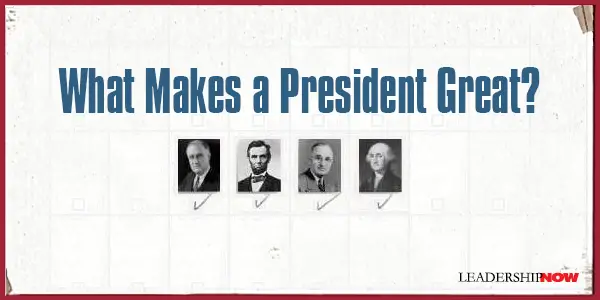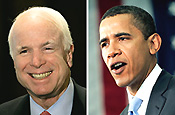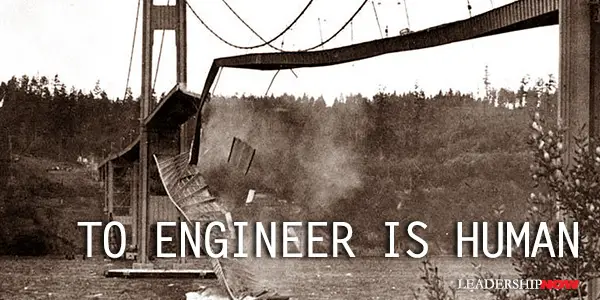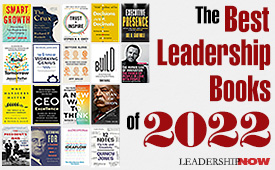 Leading Blog | Posts by Month |
 Leading Blog | Posts by Month |
06.27.08

The Offsite: A Fable to InternalizeThe Offsite is a business fable based on the principles and practices set forth in the classic leadership book, The Leadership Challenge. And it works. Using memorable characters, author Robert Thompson, has created a story that is a great introduction not only to James Kouzes’ and Barry Posner’s work, but to the practice of leadership itself.With our birds-eye view of the offsite and its main participants, we can see the mental struggles and the ah-ha experiences of the personalities as they begin to view leadership as a way of thinking and a choice that each individual must make. They begin by facing their reality and then learn to see a new way to get from where they are to where they want to be. They begin to see real leadership as helping people to discover what matters to them and helping them to connect to it. “Leadership is about people. Leadership is how you get management done. Leaders stretch others, not stress others.” Through the offsite seminar leader Charlie, Thompson presents the Five Practices of Exemplary Leaders this way: Your credibility matters so … Model the Way. How? Clarify values by finding your voice and affirming shared ideals. Set the example by aligning actions with shared values. Your voice matters so … Inspire a Shared Vision. How? Envision the future by imagining exciting and ennobling possibilities. Enlist others in a common vision by appealing to shared aspirations. Your action matters so … Challenge the Process. How? Search for opportunities by seizing the initiative and by looking outward for innovative ways to improve. Experiment and take risks by constantly generating small wins and learning from experience. Your gift matters so … Enable Others to Act. How? Foster collaboration by building trust and facilitating relationships. Strengthen others by increasing self-determination and developing competence. Your gratitude matters so … Encourage the Heart. How? Recognize contributions by showing appreciation for individual excellence. Celebrate the values and victories by creating a spirit of community. This is the kind of book you need to give to everyone on your team and to those your team interacts with. If you’ve read The Leadership Challenge (the new 4th edition will be out in paperback in August), then it’s a good reminder, if you haven’t, then it’s a great introduction. Either way, you’ll find Thompson’s story a quick read, but packed full of thoughts and concepts you’ll want to reflect on and internalize. Leadership is a way of life that takes a conscious choice to build-in to everything you do, from wherever you sit. This is a great place to begin. 
Posted by Michael McKinney at 02:35 PM
06.26.08

What’s the Hidden Danger of Being the Brightest Person In the Room?Leaders in organizations who are dealing with a specific issue or problem should ensure that they collaborate with team members toward its resolution, even if they are the best-informed, most experienced, or most-skilled person in the group. Not to do so would be fool-hardy.In fact, behavioral scientist Patrick Laughlin and his colleagues have shown that the approaches and outcomes of groups who cooperate in seeking a solution are not just better than the average member working alone, but are even better than the group’s best problem solver working alone. Far too often, leaders-who, by virtue of greater experience, skill, and wisdom, deem themselves the ablest problem solver in the group—fail to ask for input from team members. The research conducted by Laughlin and his colleagues tells us why the best leader operating individually will be beaten to a correct solution by an all-inclusive cooperating unit. First, lone decision-makers can’t match the diversity of knowledge and perspectives of a multi-person unit that includes them. Second, the solution seeker who goes it alone loses another significant advantage—the power of parallel processing. Whereas a cooperating unit can distribute many subtasks of a problem to its members, a lone operator must perform each task sequentially. But isn’t full collaboration risky? After all, decisions made completely by committee are notorious for suboptimal performance, Mindful of that problem, our recommendation is not to employ a vote-counting strategy in order to come to a resolution; in fact the recommendation is not for making joint decisions at all. The final choice is always for the leader to make. But it’s the process of seeking input that leaders should engage in more collectively. In Yes! 50 Scientifically Proven Ways to Be Persuasive authors Noah Goldstein, Steve Martin and Robert Cialdini, tackle a lot of interesting questions regarding the art and science of persuasion. For example, they ask what common mistake causes messages to self-destruct? The answer is found in the answer to why a sign pointing out the problem of vandalism in the Petrified National Park actually increased the theft of pieces of petrified wood. What we learn is to focus our communications on the fact that there are a lot of people doing the right thing and build on that. You will find a lot of good practical insights here. Adapted from Yes! 50 Scientifically Proven Ways to Be Persuasive by Noah Goldstein, Steve Martin and Robert Cialdini.
Posted by Michael McKinney at 03:15 PM
06.25.08

What Makes a President Great?
HAVING grown weary of the of what he terms as the presidential ratings game, historian, teacher, and politico Alvin Felzenberg decided to present a new ranking in his book, The Leaders We Deserved (and a Few We Didn't): Rethinking the Presidential Rating Game. Instead of evaluating the presidents and giving them a single score, he had devised six criteria to better account for their actual contribution to history. The first three criteria are: character, vision and competence. They give insight as to how they would handle the next three criteria: economic policy, the preservation and extension of liberty, and national security and defense. While you may disagree with his conclusions, you will no doubt find it useful in evaluating presidents and by extension it will give you a framework to appraise future presidential candidates. Based on this exercise, Felzenberg gives a list of what we should look for in presidential candidates: A Sense of Purpose. “Nearly all presidents who earned a rating of great or near great articulated specific goals that they wanted to achieve as president.” Examine How They Met Adversity. “All of he great and near great presidents emerged from conflicts and disappointments they encountered stronger and more resilient ten they had before. This is what made their previous ordeals transformative. All regarded these adversities as learning experiences, however painful. None emerged from such setbacks regarding themselves as victims. None were known to complain or whine—at least out loud or in public—about their private misfortunes.” Broad Life Experiences. “Most great and near great presidents had multiple occupations, not all of them in politics, before coming president. Through the depth and breadth of their experiences, successful presidents learned how to relate to people in all walks of life.”
A Well-Developed Sense of Integrity. Look for honesty (“doing what one said he would do, or explaining why unforeseen circumstances necessitated a different course”), courage (‘meeting adversity head-on, often at political or personal risk”), and integrity (“placing the interests of one’s office and one’s country ahead of personal convenience or interests, or those of one’s associates”). Humility. “Although confident in their abilities, successful presidents held their egos in check. All great and near great presidents understood that they would receive the credit for the achievements of their subordinates. For this reason they strove to find outstanding ones…including on occasion, former rivals and members of the opposition party.” The nation’s worst presidents had some or all of the following traits we would do well to avoid: • Watch out for cynicism and complacency.
According to Felzenberg we certainly deserved Lincoln, Washington, Theodore Roosevelt, Truman, Reagan, Ford, and surprisingly enough, Coolidge, among others. As he did with so much else, Ronald Reagan knew precisely what he was doing when he ordered Calvin Coolidge’s portrait hung in the White House cabinet room. Of the presidents we least deserved, most proved especially adept at mastering the electoral machinery of their respective eras and, sadly, at little else. The Leaders We Deserved is carefully considered and not only provides a fresh perspective on our nation’s presidents, but will give you a few surprising insights as well. A good book to read in this election year. Below is a list of the top twelve presidents based on Felzenberg’s criteria:

Posted by Michael McKinney at 08:21 AM
06.23.08

Define the Correct QuestionBusiness environmentalist Jack Giampalmi, remarked in a recent speech the importance of asking the right question if we are to get the solution that will bring change.Solutions are easy. Where leadership is essential is in defining and understanding the real question. For example, global warming, or climate change, finds its way onto many agendas, and many agendas may even be hidden. But is the right question being asked? Be sure to know what the real question is when faced with a problematic issue. We are constantly being bombarded and facing hidden agendas while solving problems which address the wrong question. This hinders sustainability.
Posted by Michael McKinney at 03:37 PM
06.20.08

Caesar’s Leadership: Stick to Your Guns At the town of Placentia on the banks of the Po in northern Italy, Caesar faced a full-scale mutiny by his troops. Led by malcontents in the ninth legion, the soldiers demanded more pay, but the heart of their complaint was that there were no spoils in this war as there had been in Gaul. They would fight for months to defeat an army or conquer a town, then Caesar would forgive his enemies and march on. His soldiers craved gold, women, and slaves, not clemency for the vanquished.
At the town of Placentia on the banks of the Po in northern Italy, Caesar faced a full-scale mutiny by his troops. Led by malcontents in the ninth legion, the soldiers demanded more pay, but the heart of their complaint was that there were no spoils in this war as there had been in Gaul. They would fight for months to defeat an army or conquer a town, then Caesar would forgive his enemies and march on. His soldiers craved gold, women, and slaves, not clemency for the vanquished.
 Most generals would have called the mutinous leaders together and worked out a compromise—but not Caesar. Instead, he ordered the whole army to assemble and then began to speak. He said he felt like a father faced by spoiled and unruly children. He had always seen to their needs before his own and had provided them with everything he had promised. Did they really want to see Italy laid waste like Gaul or Germany? Did they think they were better than their fellow Romans on the other side? They were proud soldiers fighting a war of principle, not a horde of ravaging barbarians sacking cities for plunder. They demanded their own way? They would not get it. Armies, he declared, cannot exist without discipline. He would therefore decimate the entire ninth legion, executing every tenth man among them as punishment and a warning to any who might question him in the future. The whole army begged Caesar to reconsider and spare the ninth legion. They were wrong to defy him, they confessed, and earnestly beseeched him not to kill men who had served him bravely for many years. Caesar reluctantly agreed to show mercy on the condition that he was given the names of the ringleaders of the rebellion, twelve of whom he would choose by lot and execute. This they did, sparing the life of one innocent man and killing in his place the centurion who had vengefully accused him. Caesar had faced down thousands of his own men and won their respect and loyalty by not yielding an inch. Adapted from Julius Caesar by Philip Freeman.
Posted by Michael McKinney at 09:10 AM
06.18.08

Bringing Your Emotions Under ControlOUR emotions can derail us. Keeping them under control is a huge part of our success as a leader. Of course, self-awareness is the key to making this happen.
How am I feeling?
She writes, “The moment you begin this self-inquiry, a switch flips in your brain. You are moving from a purely emotional response to an objective-based response.” Update:

Posted by Michael McKinney at 07:14 AM
06.16.08

McCain and Obama: What Kind of Leaders Are They? Gergen wrote in the Boston Globe that unfortunately “voters are typically left with more than candidates’ self serving, bumper sticker-caliber assertions: ‘strong leadership,’ ‘proven leadership,’ ‘new leadership,’ etc.” He adds, “perhaps more urgently than at any time since Franklin D. Roosevelt was in office, the United States needs an extraordinary leader in the White House.” To this end, last month the Center for Public Leadership in association with The Ken Blanchard Companies, convened a group of more than 200 people to develop questions for the candidates that get at their leadership capabilities. The following list of 15 questions from that meeting, is to serve as a kind of “job interview” to get at the candidates’ leadership capacity:
Who Will Be at The Table With You? How Will You Decide? How Will You Act? And What Will You Act On? What questions would you ask?
Posted by Michael McKinney at 08:53 PM
06.13.08

How to Survive the First 100 Days As the New BossThe New Boss: How to Survive the First 100 Days by Peter Fischer is a practical how-to guide to help leaders avoid typical mistakes and pitfalls and provides a proven framework and systematic approach to managing leadership transitions. While not all of the material is new, it is a welcome and fresh perspective and contains relevant examples of dos and don’ts of successful leadership transitions. Fischer’s process is well thought out and easily adapted to your new role.The chart below gives a brief overview of the issues addressed here.
Fischer also cites John Gabarro’s work (The Dynamics of Taking Charge / HBSP / 1987) in this area. Gabarro notes that a crucial factor distinguishing successful from less successful leaders in a new positions was the relationship to key people. In his studies, 75% who were not successful in their new roles after 12 months had poor working relations with their key employees. They had conflicts over objectives, leadership style, and the criteria of effective performance. I mention this in particular as this seems to me to be the most common reason new leaders are asked to move along before they really get anything done. The temptation is to go in “full boor” and show them what you know. After all that’s why they hired you. Right? But if you can’t get along and gain the trust and cooperation from the people and culture you are moving into, your competence won’t matter. Focus on the people first. Also check out: The First 90 Days: Critical Success Strategies for New Leaders at All Levels by Michael Watkins
Posted by Michael McKinney at 08:55 AM
06.11.08

Pepsico CEO Indra Nooyi on Developing Leaders
We are building talent with an enterprise mind set. We strategically build sills for key talent through carefully planned developmental assignments.
Posted by Michael McKinney at 07:28 AM
06.09.08

5 Leadership Lessons: How the Best Get Better and Stay That Way In the end, the keyword is resilience. Jones concludes, “Most of those participating in the Olympics this summer will walk away from the games without grabbing a single medal. Those with real mettle will get back into training again. That’s what truly separates elite performers from ordinary high achievers. It takes supreme, almost unimaginable grit and courage to get back into the ring and fight to the bitter end. That’s what the Olympic athlete does. If you want to be an elite performer in business, that’s what you need to do, too.”
Posted by Michael McKinney at 12:11 AM
06.06.08

Ethics: We Are They
Many people we encounter downplay the ramifications of inconsistent ethical conduct, especially when it comes to smaller compromises. On the path to becoming skilled ethical decision makers, however, we will find it helpful to take both big and small indiscretions seriously. Errors in thought are usually the same in both cases. For example, we may refer to lying as exaggeration, taking creative license, spinning. We may excuse ourselves as being lawyerly, forgetful, or tactful. But when we use euphemisms for such actions, we redefine them as less than wrong. This inculcates a risky thinking pattern, where we cloud our ability to reason—and sometimes erroneously assume the reasoning makes sense to those we deal with. In a Zogby International poll of eight thousand adults, 97 percent said they consider themselves trustworthy. On the other hand, only 75 percent consider the people they work with and live near trustworthy. Allow us to speculate that the gap between these two figures may reflect more than perception. Behaviors that may seem ethical to us may not be considered so high-minded by people we deal with. Transgressions crop up in the lives of people across all levels of society. The individuals perpetrating them have all levels of education and work in all professions, trades, and industries. It is counterproductive to think we are not players on a landscape dotted with pitfalls we may stumble into ourselves. Temptation is everywhere—and so is compromise. One danger is that we will get caught up in a sequence of not just small temptations but big ones. Maybe they will be life changing or life threatening. Faulty thinking can lure us into wrongs we never imagined. Philip Zimbardo, a psychology professor at Stanford University, has for decades studied the genesis of evil. He writes, “Virtually anyone could be recruited to engage in evil deeds that deprive other human beings of their dignity, humanity and life . . . we live with the illusion of moral superiority . . . We take false pride in believing that ‘I am not that kind of person.’” The fact is, we are all that kind of person. We are they. Through thinking errors, denial, and rationalization, we can all be put in a position of selling our character for a pittance, of sacrificing our relationships for a song. That’s yet another reason why it is helpful to take a conscious, systematic approach to breaking risky ethical thinking habits—on even the small things. Adapted from Ethics for the Real World: Creating a Personal Code to Guide Decisions in Work and Life by Ronald A. Howard and Clinton D. Korver
Posted by Michael McKinney at 01:31 AM
06.05.08

Out of Context: Building Meaning Into Your Life“Meaning is not something you stumble across, like an answer to a riddle or the prize in a treasure hunt. Meaning is something you build into your life. You build it out of your own past, out of your affections and loyalties, out of the experience of humankind as it is passed on to you, out of your own talent and understanding, out of the things you believe in, out of the things and people you love, out of the values for which you are to sacrifice something. The ingredients are there. You are the only one who can put them together into that unique pattern that will be your life. Let it be a life that has dignity and meaning for you. If it does, then the particular balance of success or failure—as the world measures success or failure—is of less account.” —John W. Gardner, Living, Leading, and the American Dream
Posted by Michael McKinney at 08:53 AM
06.02.08

To Engineer Is Human
AT Book Expo America held in Los Angeles this last weekend, Todd Sattersten gave me an excerpt containing two reviews from the book he wrote with Jack Covert entitled, The 100 Best Business Books of All Time. Todd’s review of To Engineer Is Human was a book I had never read. It was such a well-crafted synopsis that I quickly went out and got the book. He extracted the following idea from the book that caught my attention: Much lip service is given to accepting failure in business as natural phase in the learning process, yet internalizing the idea seems a little more difficult. Shareholders don’t show sympathy for failed products. Customers expect their product to arrive when promised and in pristine condition. Most of the other books featured in these pages detail the workings of successful companies, while Petroski’s book tells a more complicated tale of failure, one in which business practitioners can find wisdom. The most important lesson has to be appreciating failure as a learning opportunity. Failure is common. Not learning from failure forces companies to repeat the same mistakes again. In engineering, that repetition can cost lives; in business, our livelihood. Henry Petrosky wrote that “no one wants to learn by mistakes, but we cannot learn enough from successes to go beyond the state of the art.” The core of the problem would seem to be the stakeholder's failure – or certainly their reluctance – to take the long view. If the rest of the reviews are anything like Todd’s review, the book should be a good read and a valuable reference tool. 
Posted by Michael McKinney at 03:35 PM
06.01.08

Leadership Books: June 2008Here's a look at some of the best leadership books to be released in June.




Posted by Michael McKinney at 09:50 AM
|
BUILD YOUR KNOWLEDGE


How to Do Your Start-Up Right STRAIGHT TALK FOR START-UPS 
Grow Your Leadership Skills NEW AND UPCOMING LEADERSHIP BOOKS 
Leadership Minute BITE-SIZE CONCEPTS YOU CAN CHEW ON 
Classic Leadership Books BOOKS TO READ BEFORE YOU LEAD |
|